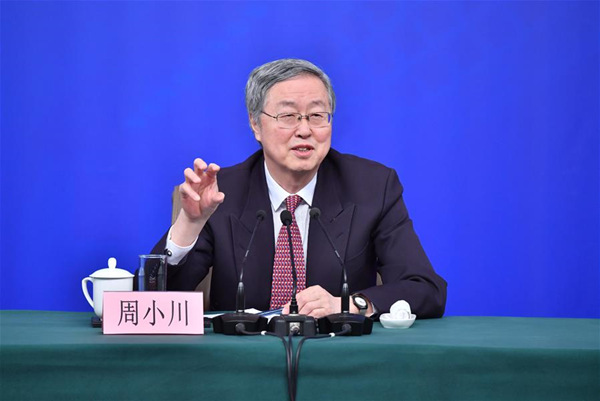
Zhou Xiaochuan, governor of the People's Bank of China (PBOC), answers questions at a press conference on financial reform and development on the sidelines of the first session of the 13th National People's Congress in Beijing, capital of China, March 9, 2018. (Xinhua/Li Xin)
It has been ten years since a global financial crisis swept the world's major economies. While a global recovery is finally underway, the world's second largest economy is staying alert against systemic financial risks. [Special coverage]
As one of China's "three tough battles" for the next three years, forestalling systemic risks is being heatedly discussed by the country's lawmakers and political advisors at the ongoing annual legislative and political advisory sessions.
China will deepen institutional reform in the financial sector and improve its financial regulatory system to defuse financial risks, they said.
Institutional reform in the financial sector is underway, and deputies to the National People's Congress (NPC) will discuss deepening reform in financial institutions in the following days, said Zhou Xiaochuan, China's central bank governor, on the sidelines of the NPC session.
The central bank will play an important role in financial supervision in China, Zhou said, adding that loopholes in the financial regulatory system need to be closed, flaws in regulations need to be corrected and all risks that have already appeared need to be handled immediately, so as to maintain the health of the financial system.
He added that the central bank would take the lead in coordination among supervision institutions.
"China has entered a stage of stabilizing the leverage ratio and is gradually reducing it," Zhou said, noting that China is likely to reduce reliance on wide capital support for economic growth as the country seeks high-quality development.
China's Finance Minister Xiao Jie said earlier this week that he is confident of fully forestalling systemic risks.
The country's debt-to-GDP ratio had decreased to 36.2 percent by the end of 2017 from 36.7 percent in 2016, far below the international alert line of 60 percent, according to Xiao.
The ratio is also relatively low compared with the levels of major economies and emerging countries, the minister said, who expects "no significant change" in the ratio in the coming years.
The Chinese government has placed high attention on the management of government debt and is firm in cracking down on irregularities in financing activities, he said.
Nearly 100 people were held responsible for misconduct and irregularities related to local government debt in 2017.
The banking regulators imposed a fine of 52.5 million yuan on 19 banking institutions over a pledge loan fraud case in Shaanxi and Henan provinces, and 295 million yuan on 12 banks over a bill fraud case in northwest China's Gansu Province, the China Banking Regulatory Commission announced in January and February.
Chinese Premier Li Keqiang on Monday expressed strong confidence in the nation's economy and its ability to prevent systemic risks.
The country will strengthen coordination in financial regulation, improve regulation over shadow banking, internet finance, and financial holding companies, and further improve financial regulation, Li said, stressing that all forms of borrowing and debt underwriting that violate the law and regulations are strictly prohibited.
Chen Jing, an NPC deputy from Shanghai, said he would make a suggestion focusing on deepening reform in the financial sector.
He also called for more cooperation between financial supervision institutions, public security departments, procuratorates, courts, and local governments to strengthen cooperation in forestalling financial risks.
Deputy Zhang Zhaoan, who is also vice president of Shanghai Academy of Social Sciences, suggested that more regulatory technology should be applied in government financial regulation.
Technology like machine learning, big data, and cloud computing could be very helpful for the government and financial institutions in updating regulatory measures, said Zhang.


















































